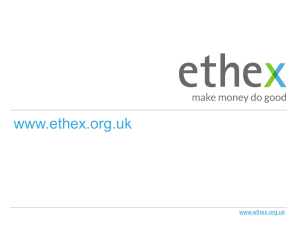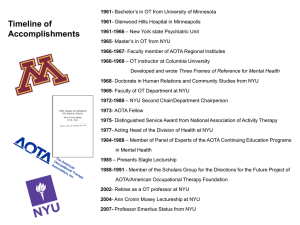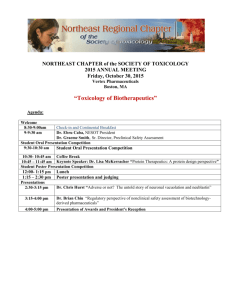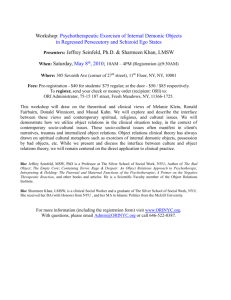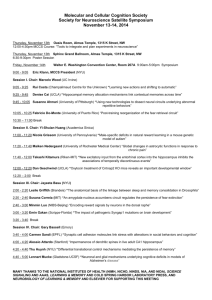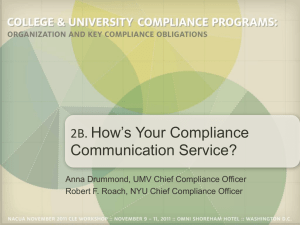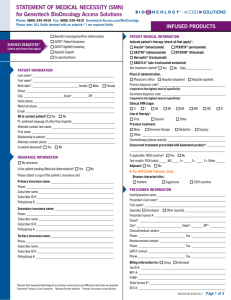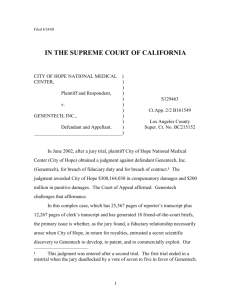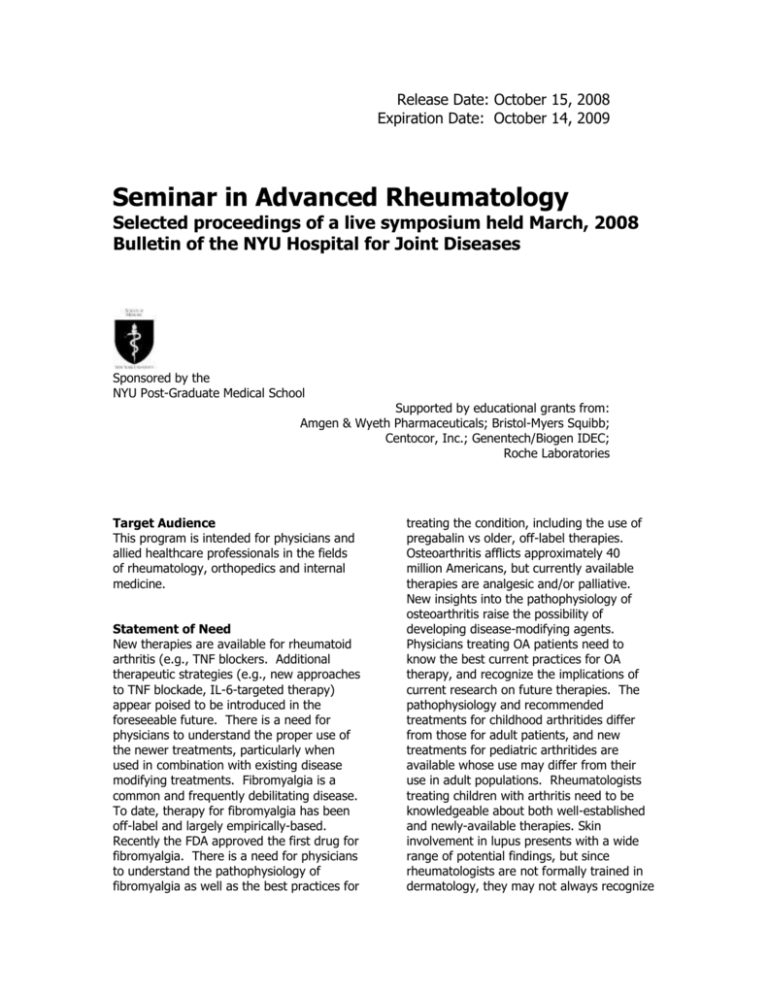
Release Date: October 15, 2008
Expiration Date: October 14, 2009
Seminar in Advanced Rheumatology
Selected proceedings of a live symposium held March, 2008
Bulletin of the NYU Hospital for Joint Diseases
Sponsored by the
NYU Post-Graduate Medical School
Supported by educational grants from:
Amgen & Wyeth Pharmaceuticals; Bristol-Myers Squibb;
Centocor, Inc.; Genentech/Biogen IDEC;
Roche Laboratories
Target Audience
This program is intended for physicians and
allied healthcare professionals in the fields
of rheumatology, orthopedics and internal
medicine.
Statement of Need
New therapies are available for rheumatoid
arthritis (e.g., TNF blockers. Additional
therapeutic strategies (e.g., new approaches
to TNF blockade, IL-6-targeted therapy)
appear poised to be introduced in the
foreseeable future. There is a need for
physicians to understand the proper use of
the newer treatments, particularly when
used in combination with existing disease
modifying treatments. Fibromyalgia is a
common and frequently debilitating disease.
To date, therapy for fibromyalgia has been
off-label and largely empirically-based.
Recently the FDA approved the first drug for
fibromyalgia. There is a need for physicians
to understand the pathophysiology of
fibromyalgia as well as the best practices for
treating the condition, including the use of
pregabalin vs older, off-label therapies.
Osteoarthritis afflicts approximately 40
million Americans, but currently available
therapies are analgesic and/or palliative.
New insights into the pathophysiology of
osteoarthritis raise the possibility of
developing disease-modifying agents.
Physicians treating OA patients need to
know the best current practices for OA
therapy, and recognize the implications of
current research on future therapies. The
pathophysiology and recommended
treatments for childhood arthritides differ
from those for adult patients, and new
treatments for pediatric arthritides are
available whose use may differ from their
use in adult populations. Rheumatologists
treating children with arthritis need to be
knowledgeable about both well-established
and newly-available therapies. Skin
involvement in lupus presents with a wide
range of potential findings, but since
rheumatologists are not formally trained in
dermatology, they may not always recognize
the rashes of lupus or know the best
treatments for these conditions. Giant cell
arteritis is a form of vasculitis that carries a
risk of disastrous outcomes including
blindness. While steroids are effective in
many patients, some patients respond
poorly or fail to tolerate the treatment. For
these patients, there is a strong need for
better insights into, and approaches for,
vasculitis management.
Educational Objectives
recognize the new therapies available
for the treatment of rheumatoid arthritis
and develop individualized treatment
plans to ameliorate symptoms, improve
joint function and slow disease
progression;
distinguish between the currently
available therapies for fibromyalgia, and
based on best-practice data, develop
decision making protocols for optimizing
therapy for individual patients;
apply knowledge of osteoarthritis
pathophysiology and therapeutic bestpractices to develop treatment plans
that provide optimum benefit with
minimal risk to specific patients;
recognize the indications and
contraindications for both established
and newer therapies available for the
treatment of pediatric arthritis, and
develop a treatment plan for the safe,
appropriate and effective treatment of
pediatric arthritis patients;
identify specific rash types on lupus
patients, and treat and monitor
appropriately with the most effective
medications;
identify patients who are failing or are
likely to fail conventional therapy for
giant cell arteritis, and institute
appropriate alternative treatments.
Credit Designation Statement
The NYU Post-Graduate Medical School
designates this educational activity for a
maximum of 7 AMA PRA Category 1
CreditsTM. Physicians should only claim
credits commensurate with the extent of
their participation in the activity.
Method of Participation
To receive up to 7 CME credits, read this
supplement, which should take 7 hours of
your time, complete the post-test with a
minimum passing grade of 70%, complete
the evaluation, and submit to the NYU PostGraduate Medical School (instructions
enclosed).
This activity is valid for credit from October
15, 2008 through October 14, 2009.
Faculty Credentials
Steven B. Abramson, MD
Professor of Medicine and Pathology
NYU School of Medicine
New York, NY
Clifton Bingham, MD
Professor of Medicine
Johns Hopkins University
School of Medicine
Baltimore, MD
Lindsey Criswell, MD
Professor of Medicine
University of California San Francisco
San Francisco, CA
Gary Hoffman, MD
Professor of Medicine
Cleveland Clinic Foundation
Cleveland, OH
Stephen Honig, MD
Accreditation Statement
The NYU Post-Graduate Medical School is
accredited by the Accreditation Council for
Continuing Medical Education (ACCME) to
provide continuing medical education for
physicians.
Clinical Associate Professor of Medicine
NYU School of Medicine
New York, NY
David Hunter, MD
Professor of Medicine
Boston University School of Medicine
Boston, MA
Michael Lockshin, MD
Professor of Medicine
Weill Medical College of
Cornell University
New York, NY
Philip Mease, MD
Clinical Professor of Medicine
University of Washington
School of Medicine
Seattle, WA
Michael H. Pillinger, MD
Associate Professor of Medicine
and Pharmacology
NYU School of Medicine
New York, NY
Theodore Pincus, MD
Clinical Professor of Medicine
NYU School of Medicine
New York, NY
James Tumlin, MD
Associate Professor of Medicine
Emory University Medical School
Charlotte, NC
John Varga, MD
Professor of Medicine
Northwestern University
Feinberg School of Medicine
Chicago, IL
Joan von Feldt, MD
Disclosure Statement
The NYU Post-Graduate Medical School
adheres to ACCME Essential Areas and
policies, including the Standards for
Commercial Support, regarding industry
support of continuing medical education.
In order to resolve any identified
conflicts of interest, disclosure
information is provided during the
planning process to ensure resolution of
any identified conflicts. Disclosure of
faculty and commercial relationships as
well as the discussion of unlabeled or
unapproved use of any drug, device or
procedure by the faculty is listed below.
Steven B. Abramson, MD
serves as a
consultant to Novartis Pharmaceuticals
Corp., Merck & Co., Inc., Pfizer, Inc.,
Schering-Plough,
CombinatoRx
and
Amgen.
Clifton O. Bingham, III, MD serves as a
consultant to Abbott Laboratories,
Amgen, Novartis Pharmaceuticals Corp.,
Merck & Co., Genentech, Targeted
Genetics and NiCox. He is the recipient
of research funding from Genentech and
Wyeth Pharmaceuticals. He is also the
recipient of educational grant support
from Abbott Laboratories, Amgen,
Bristol-Myers Squibb, Genentech and
Centocor, Inc.
Lindsey Criswell, MD, MPH has no
financial relationships to disclose.
Gary S. Hoffman, MD has no financial
relationships to disclose.
Associate Professor of Medicine
University of Pennsylvania
Philadelphia, PA
Stephen Honig, MD serves on the
Yusuf Yazici, MD
David Hunter, MBBS, MSc, PhD is the
Assistant Professor of Medicine
NYU School of Medicine
New York, NY
speakers’
bureau
Pharmaceuticals Corp.
of
Novartis
recipient of research funding from
DonJoy, Inc., Pfizer, Inc., Merck & Co.,
Inc., AstraZeneca Pharmaceuticals LP
and Wyeth Pharmaceuticals.
Michael Lockshin, MD has no financial
Yusuf Yazici, MD serves as a consultant
relationships to disclose. Dr. Lockshin’s
presentation will include discussion of
the unlabeled or unapproved use of a
drug, device or procedure; i.e.,
rituximab, heparin.
to Roche Laboratories, Celgene, BristolMyers Squibb Co. and Centocor, and
serves on the speakers’ bureau of Pfizer,
Inc. and Bristol-Myers Squibb Co.
Philip Mease, MD serves as a consultant
The independent reviewer of this
activity has no financial relationships to
disclose.
to Amgen, Abbott Laboratories, Biogen
IDEC, Centocor, Genentech, Roche
Laboratories, Wyeth Pharmaceuticals
and UCB, Inc. He also serves on the
speakers’ bureau of Amgen, Abbott
Laboratories, Biogen IDEC, Centocor,
Genentech and Wyeth Pharmaceuticals.
In addition, Dr. Mease is the recipient of
research funding from Amgen, Abbott
Laboratories, Biogen IDEC, Centocor,
Genentech, Roche Laboratories and
Wyeth Pharmaceuticals.
Michael Pillinger, MD has no financial
relationships to disclose.
Theodore Pincus, MD serves as a
consultant to UCB, Inc., Bristol-Myers
Squibb and Abbott Laboratories. He is
the recipient of research funding from
Bristol-Myers Squibb and Amgen.
James A. Tumlin, MD serves as a
consultant to FlowMedica Corp., GE
Healthcare,
Genentech,
Ineos
Corporation.
He is the recipient of
research funding from FlowMedica
Corp., GE Healthcare, Genentech,
Abbott Pharmaceuticals and Ineos
Corporation.
John Varga, MD is the recipient of
research
funding
from
Novartis
Pharmaceuticals Corp.
Dr. Varga’s
presentation will include discussion of
the unlabeled or unapproved use of a
product; i.e, imatinib mesylate.
Joan Von Feldt, MD serves as a
consultant to Genentech/Biogen IDEC
and Amgen. Dr. Von Feldt’s presentation
will include discussion of the unlabeled
or unapproved use of a drug, device or
procedure; i.e., hydroxychloroquine and
rituximab.
Copyright © 2008, the NYU PostGraduate Medical School. All rights
reserved.

